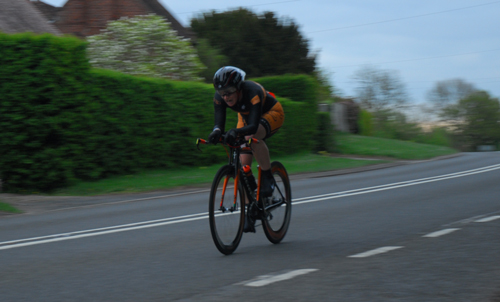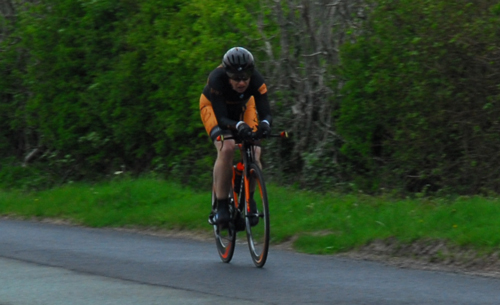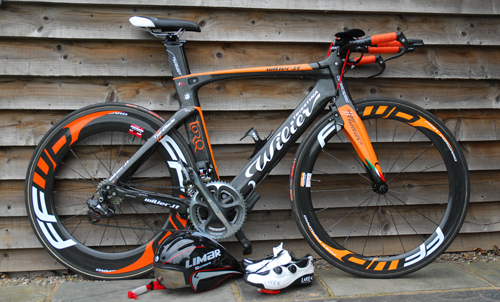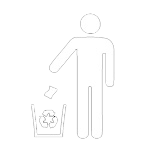Track cyclist Jan talks about riding her first Time Trial in five years and gives a tongue in cheek look at how she deals with a poor performance…
It could be said that I have fairly lofty ambitions for this season. However, even if I didn’t, I know that I cannot even hope to continue to hold my own in the National Omnium Series unless I step up my training; as every year, the competition gets stronger and more aggressive. The UK produces some of the best track cyclists in the World and I have seen quite a number who have used the Omnium Series as their spring board into the GB squad and the Series trophy now reads like a who’s who of Women’s cycling.
Add to that my desire to set a World Masters’ Record in the 2k pursuit in October and it is clear that I need to do some things differently. This has meant that the endurance side of my training has increased significantly; I now properly understand the meaning of over-reaching and have become a real bore with my power numbers.
In truth, I really enjoy the training (in a masochistic sort of way), but when it comes to racing, I put off entering “the first race of the Season” for as long as I possibly can. A bit like a trip to the dentist! So this year, when it became obvious to everyone around me that I was really dragging my feet, my coach pretty much insisted that I go out and ride a local 10 mile Time Trial.
For me, the first race of the season needs to tick a couple of boxes. Firstly, I need for it to be a local – I do enough traveling when I am chasing the National Series around the country. Add to that the European and World Masters Track Championships (which can involve trips abroad) and so a local 10 seemed quite perfect.

Secondly, it needs to be low key – I am very happy for the results never to be seen by anyone except those who race and ideally there will be no expectation on me to do well. Again (on paper at least), a club 10 ticked that box; I hadn’t ridden a time trial for five years, so surely no one in this community would even know me and if they did, they couldn’t possibly expect that I would be a force to be reckoned with?
Sadly, I was busted before I even started. As when my email came back from the club’s Chairman (to confirm that the TT was indeed open to Non-Club Members), it also elicited an exceptionally generous comment of “it will be really interesting to see how your times compare to some of our other regular female TT riders, you will certainly give them something to aim for” and finished with “obviously we would welcome a cyclist with your palmarès into the club.” Don’t get me wrong, I am hugely flattered when anyone notices my results, but these words were certain to ensure that I was doomed to mediocrity.
I am neither stupid nor arrogant enough to expect that I can step up from riding a respectable 2K pursuit in the wonderfully controlled environment of a velodrome, to a 10 mile Time Trial on the road and be an instant sensation. The pacing is entirely different – 10 miles is just over eight times further than two kilometres – and then there are climbs and descents to be ridden on a bike with gears and brakes – a concept which is certain to catch on!

Sure enough I was very very average, which sentenced me to working through the usual four stages of grief that a competitive cyclist goes through when dealing with the reality that they are not as good as they hoped they would be. It goes something like this:
1. Denial – this involves the checking and re-checking of equipment, at the very least a calibration of the power meter and a full analysis of the numbers in Excel. In the worst cases, it can extend to a direct challenge to the time keeper’s methods and stop watch accuracy.
2. Anger – characterised by repeating the words “I have done too much training to be so average.” This is the stage when you realise you could have had a lot more fun sitting at home with a glass of wine than you did beasting yourself on a bike in the middle of nowhere, for nothing but a large portion of humble pie.
3. Depression – is typified by fantasies about how much money could be raised by selling all the bikes on ebay and what could be done with the time and energy that would be freed up by giving up cycling altogether.
4. Acceptance – finally the realisation that ”it is what it is” and no one died. It becomes clear that there are a number of positives that can be drawn from the experience and on reflection it’s not all bad. Towards the end of this stage, acceptance turns to the steely determination that next time will be different, better, faster and plans for the next race are put into place.
And so, even as I write this, I know that I will race again next week and the week after that, because I feel sure that with a bit more experience, I will pace the effort better and ultimately go faster. Of course, if this self-belief does not prove to be well founded, I will undoubtedly plunge back into the four stages above, but spend longer battling with Denial and Anger …
Thanks as always to those that support me – mentally as well as physically! – my husband David Jack puts up with so much, as does my coach Chris Davies. Then there are the companies that support me as well:







